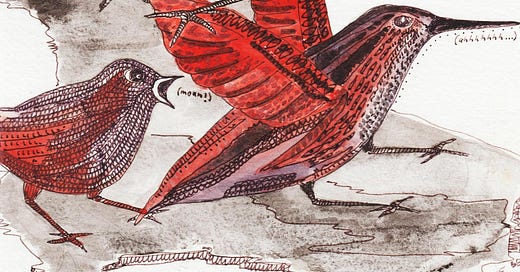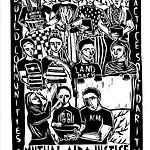Hello friends and comrades,
We hope, where you are, the lights and fridge are back on, the debris has been cleared, the water has receded, the damp has dried, the mould has been vinegared, the silt and mud shovelled and mopped away, and that you’ve had a bit of a chance to rest as well as recover after Cyclone Alfred.
We are continuing our series - begun last week on our broadcast show on 4ZZZ and then sent out in our podcast feed - on Disaster, Crisis, and Collective Futures. What is it about disasters that enables us to plan and act together with neighbours and strangers, more collaboratively, more collectively, more generously? How do public and private institutions leverage crises to retain and expand their control, reasserting racial, colonial, capitalist, cisheteropatriarchal and ableist imaginaries and practices?
In the wake of Cyclone Alfred, we’ve seen expressions of the former, of practices consistent with ‘disaster communism’ (as we discuss with Nick Southall in this podcast episode!) - neighbours, friends, strangers, coming together to organise and share resources and energy to prepare, survive, and recover from the cyclone and its aftermath. People looked out for each other.
We’ve also, unfortunately, seen expressions of the latter, of practices consistent with ‘disaster capitalism’ - in this instance, Lord Mayor Schrinner using the cover of the disaster to evict rough sleepers from parks, from public spaces, across the city. (Notably, people are not having it, and in the week since Schrinner’s announcement there have been multiple events held and yet more organised that stand in solidarity with unhoused people across this city).
To help us think through all this, we had a chat with Dr Nick Southall, long term community organiser, academic at University of Wollongong, author of the blog ‘revolts now’ and the new book, ‘Disaster Communism and Anarchy in the Streets’.
In this chat we talk about disaster communism as the agonistic opposite to disaster capitalism. We discuss what disaster communism is, and the everyday actions by everyday people that constitute it. We talk about how it is that certain kinds of community relations and modes of organising somehow seem more possible in times of environmental disasters, the importance of fighting to reconfigure our relations to time so we all have more capacity to do the kinds of loving, caring work that can liberate us from racial colonial capitalism, and reflect a little on what our orientation to the State should be.
In future shows we’ll talk more about this last point, and consider the ways that the settler colonial state seeks to coopt, defuse, neutralise, and disband the practices and expressions of disaster communism as they appear, and the implications of that for our organising and resistance. We’ll also talk more about how the solidarities that can form during moments of disaster may be deliberately fractured along the well-worn lines of colonialism, racism, ableism, classism, cisheteropatriarchy, etc., and how we can guard against that.
But in this podcast we want to focus particularly on disaster communism, and the possibilities it attunes us to. We want to attend to what’s just happened, and acknowledge and learn from this and other examples of emergent organising, and how existing networks and relationships can blossom and expand to meet the scale of the unfolding (poly)crisis.
As always, there’s lots happening across Magan-djin that you can get directly involved with:
Tomorrow, Friday 21st March at 6pm in King George Square is a rally and march calling to end the blockade on Palestine. This rally demands an end to the bombing and restoration of electricity and aid to Gaza, and an end to the political persecution of Palestinian activists. For those who are fasting, snacks will be available to break fast, along with arrangements to pray.
Saturday, 22nd March at 10am in Queens Gardens is a picnic and march to defend Victoria Park/ Barrambin - a culturally and environmentally significant greenspace - against the development of an Olympic stadium.
Friday, 28th March at 12:30pm at 1 William Street, Brisbane is the Kindness First: support for Brisbane residents experiencing homelessness protest, demonstrating the community outrage at the persistent failure of multiple governments and agencies to provide safe, adequate, affordable, stable housing for people in our community, who are now facing further attacks on their use of public space.
See you out there!
Yours in solidarity,
The Radio Reversal Collective
References for this podcast episode:
Klein, Naomi (2007) The Shock Doctrine: The Rise of Disaster Capitalism. Penguin Books
Loewenstein, Antony (2015) Disaster Capitalism: Making a Killing out of Catastrophe. Verso Books
Solnit, Rebecca (2009) A Paradise Built in Hell: The Extraordinary Communities That Arise in Disaster. Viking Press
Southall, Nick (2024) Disaster Communism and Anarchy in the Streets. Kembla Books









Share this post